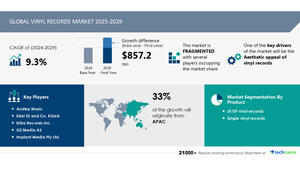NEW YORK, Jan. 27, 2025 /PRNewswire/ -- Report on how AI is driving market transformation - The global electric vehicle (EV) market size is estimated to grow by USD 446.4 billion from 2025-2029, according to Technavio. The market is estimated to grow at a CAGR of 16.4% during the forecast period. Growing demand for low-emission vehicles is driving market growth, with a trend towards charging stations powered through renewable energy. However, insufficient charging infrastructure poses a challenge. Key market players include Bayerische Motoren Werke AG, BYD Co. Ltd., Chery Automobile Co. Ltd., China Dong Feng Motor Industry Imp. And Exp. Co. Ltd., Chongqing Changan Automobile Co. Ltd., Ford Motor Co., Geely Auto Group, General Motors Co., Guangzhou Automobile Group Co. Ltd, Honda Motor Co. Ltd., Hyundai Motor Co., Mahindra and Mahindra Ltd., Mercedes Benz Group AG, Nissan Motor Co. Ltd., Renault SAS, SAIC Motor Corp. Ltd., Stellantis NV, Tesla Inc., Toyota Motor Corp., and Volkswagen AG.
Key insights into market evolution with AI-powered analysis. Explore trends, segmentation, and growth drivers- View Free Sample PDF
Electric Vehicle (EV) Market Scope |
|
Report Coverage |
Details |
Base year |
2024 |
Historic period |
2019 - 2023 |
Forecast period |
2025-2029 |
Growth momentum & CAGR |
Accelerate at a CAGR of 16.4% |
Market growth 2025-2029 |
USD 446.4 billion |
Market structure |
Fragmented |
YoY growth 2022-2023 (%) |
13.7 |
Regional analysis |
APAC, Europe, North America, South America, and Middle East and Africa |
Performing market contribution |
APAC at 59% |
Key countries |
China, US, Norway, Japan, Germany, South Korea, India, UK, France, and Canada |
Key companies profiled |
Bayerische Motoren Werke AG, BYD Co. Ltd., Chery Automobile Co. Ltd., China Dong Feng Motor Industry Imp. And Exp. Co. Ltd., Chongqing Changan Automobile Co. Ltd., Ford Motor Co., Geely Auto Group, General Motors Co., Guangzhou Automobile Group Co. Ltd, Honda Motor Co. Ltd., Hyundai Motor Co., Mahindra and Mahindra Ltd., Mercedes Benz Group AG, Nissan Motor Co. Ltd., Renault SAS, SAIC Motor Corp. Ltd., Stellantis NV, Tesla Inc., Toyota Motor Corp., and Volkswagen AG |
Market Driver
The Electric Vehicle (EV) market is surging forward with trends like lower battery costs, 5G rollouts, and advancements in EV technology. OEMs are focusing on developing Battery Electric Vehicles (BEVs) for both light duty and heavy duty applications. Solid State Batteries are the new frontier, promising longer range and faster charging times. Fuel Cell Electric Vehicles (FCEVs) using hydrogen fuel cells are also gaining traction. Sales of electric cars, electric two wheelers, and off-highway vehicles are on the rise, threatening the dominance of gasoline and diesel-powered vehicles. Top speeds, ranges, and costs vary across passenger cars, commercial fleets, and small electric vehicles. The EV ecosystem includes components like traction battery packs, motors, brakes, wheel and suspension, body and chassis, machine language, artificial intelligence, sensors, software, and hardware. The future of EVs depends on continuous innovation and infrastructure development, including EV charging infrastructure, battery cell factories, and BSVI vehicles. The impact on crude oil, gasoline, and diesel prices remains significant.
The electric vehicle (EV) market is experiencing significant growth as more fleet operators elect to switch to electric vehicles and consumers adopt this sustainable mode of transportation. This trend will result in a substantial increase in electricity demand. In response, utility companies are exploring renewable energy sources, such as solar and wind power, to meet this growing need. This shift to renewable energy not only reduces carbon emissions from vehicles but also decreases air and noise pollution. The cost-effective and practical nature of renewable energy makes it an ideal solution for meeting the rising electricity demands in the EV market.
Request Sample of our comprehensive report now to stay ahead in the AI-driven market evolution!
Market Challenges
- The Electric Vehicle (EV) market is experiencing significant growth, with sales of electric cars, buses, trucks, two-wheelers, and off-highway vehicles on the rise. However, challenges persist. EV batteries, a key component, need improvement in terms of lower costs and longer life. Solid State Batteries hold promise, but commercialization is years away. Fast charging infrastructure development is essential to address range anxiety. OEMs are investing in FCEVs using fuel cells, but hydrogen production and infrastructure remain costly. Crude oil and gasoline prices impact traditional vehicles, but EVs offer long-term cost savings. 5G rollouts will enhance charging and connectivity. Lower battery costs, advancements in machine learning, AI, and sensor technology will drive growth in PEVs, including heavy-duty and light-duty commercial fleets, passenger cars, and small electric vehicles. Battery cell factories and BSVI vehicles are crucial for the transition. Top Speed, Range, and vehicle types vary from Front wheel drive to All wheel drive, Rear wheel drive, and Traction battery packs. Motors, Brakes, Wheel and suspension, Body and chassis, and Software-Hardware integration are critical components.
- The electric vehicle (EV) market is experiencing significant growth, with increasing consumer demand. However, a major challenge is the insufficient charging infrastructure. In the US, for instance, there are only 16 charging stations per 100 EVs, compared to 225 gas or diesel pump stations per 100 vehicles. With the launch of more long-range EVs and their larger, more powerful batteries, the need for larger charging systems becomes essential. Governments and vendors must collaborate to address this issue and expand charging infrastructure to support the anticipated growth in EV adoption.
Discover how AI is revolutionizing market trends- Get your access now!
Segment Overview
This electric vehicle (ev) market report extensively covers market segmentation by
- Type
- 1.1 BEV
- 1.2 PHEV
- Charging
- 2.1 Normal charging
- 2.2 Super charging
- Geography
- 3.1 APAC
- 3.2 Europe
- 3.3 North America
- 3.4 South America
- 3.5 Middle East and Africa
1.1 BEV- Electric Vehicles (EVs), specifically Battery Electric Vehicles (BEVs), are gaining popularity due to their benefits over traditional Internal Combustion Engine (ICE) vehicles. From a manufacturing perspective, BEVs are easier and less capital-intensive to produce as they contain only one motor and a battery, unlike Plug-in Hybrid Electric Vehicles (PHEVs) which include an ICE. The simplicity of design leads to lower maintenance costs and fewer components. BEVs also offer zero emissions, greater interior space, and lower operating costs. However, they rely on charging infrastructure and have a limited driving range compared to other types. Technological advancements in battery technology are expected to increase the range and reduce the dependency on charging stations. Major BEV manufacturers like Tesla and General Motors, along with EV battery producers such as LG Chem and SK Innovation, are expanding production facilities, driving down costs and increasing sales in all regions. A secure and stable EV supply chain will further support the growth of BEVs in the global electric vehicle market.
Download a Sample of our comprehensive report today to discover how AI-driven innovations are reshaping competitive dynamics
Research Analysis
The Electric Vehicle (EV) market is experiencing rapid growth as the world shifts towards sustainable transportation. EVs, including battery electric cars, buses, trucks, two wheelers, and off-highway vehicles, are becoming increasingly popular due to their environmental benefits and lower operating costs. EV batteries are a critical component, with solid state batteries promising higher energy density and faster charging times. Fast charging infrastructure is expanding, making long-distance travel more feasible. Fuel Cell Electric Vehicles (FCEVs) using hydrogen fuel cells are another option for heavy-duty applications. OEMs are investing heavily in EV technology, leading to advancements in top speed, range, and affordability. The shift to EVs is influenced by factors like 5G rollouts, lower battery costs, and rising gasoline and diesel prices. Commercial fleets and passenger cars are transitioning, with light duty and heavy duty vehicles seeing significant adoption. The future of transportation is electric.
Market Research Overview
The Electric Vehicle (EV) market is experiencing rapid growth as the world transitions towards sustainable transportation. EVs, including battery electric vehicles (BEVs) and hybrid electric vehicles (HEVs), are gaining popularity due to their environmental benefits and lower operating costs. EV batteries, a critical component, are becoming more affordable with advancements in technology, such as Solid State Batteries. EV fast charging infrastructure is expanding, enabling longer trips, and 5G rollouts will further enhance charging capabilities. OEMs are investing heavily in EV production, with offerings ranging from passenger cars to heavy-duty commercial fleets, electric two wheelers, and off-highway vehicles. Top Speed and Range are improving, making EVs increasingly competitive with traditional gasoline and diesel-powered vehicles. The shift towards BSVI vehicles and PEVs is accelerating, with front-wheel, rear-wheel, and all-wheel drive options available. Machine Language, Artificial Intelligence, Internet penetration, Sensors, Software, and Hardware are all playing crucial roles in enhancing EV performance and user experience.
Table of Contents:
1 Executive Summary
2 Market Landscape
3 Market Sizing
4 Historic Market Size
5 Five Forces Analysis
6 Market Segmentation
- Type
- BEV
- PHEV
- Charging
- Normal Charging
- Super Charging
- Geography
- APAC
- Europe
- North America
- South America
- Middle East And Africa
7 Customer Landscape
8 Geographic Landscape
9 Drivers, Challenges, and Trends
10 Company Landscape
11 Company Analysis
12 Appendix
About Technavio
Technavio is a leading global technology research and advisory company. Their research and analysis focuses on emerging market trends and provides actionable insights to help businesses identify market opportunities and develop effective strategies to optimize their market positions.
With over 500 specialized analysts, Technavio's report library consists of more than 17,000 reports and counting, covering 800 technologies, spanning across 50 countries. Their client base consists of enterprises of all sizes, including more than 100 Fortune 500 companies. This growing client base relies on Technavio's comprehensive coverage, extensive research, and actionable market insights to identify opportunities in existing and potential markets and assess their competitive positions within changing market scenarios.
Contacts
Technavio Research
Jesse Maida
Media & Marketing Executive
US: +1 844 364 1100
UK: +44 203 893 3200
Email: [email protected]
Website: www.technavio.com/
SOURCE Technavio

WANT YOUR COMPANY'S NEWS FEATURED ON PRNEWSWIRE.COM?
Newsrooms &
Influencers
Digital Media
Outlets
Journalists
Opted In




Share this article